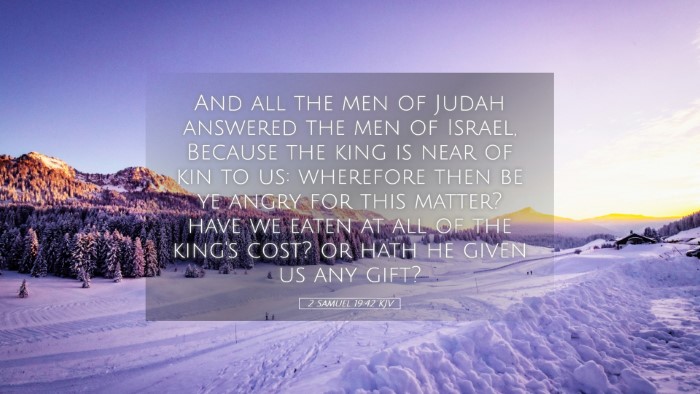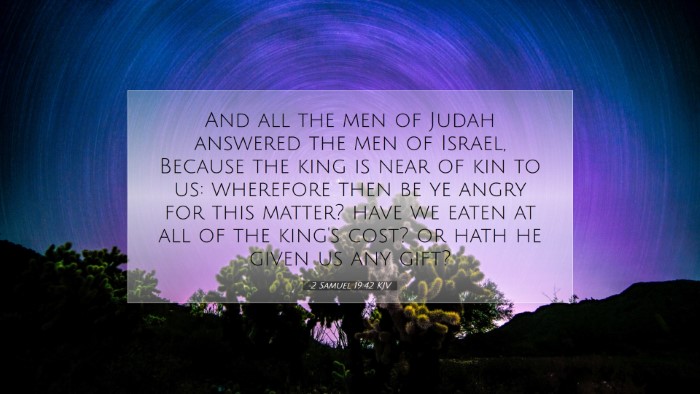Commentary on 2 Samuel 19:42
Verse Reference: 2 Samuel 19:42 - "And all the men of Judah answered the men of Israel, Because the king is near of kin to us: wherefore then be ye angry for this matter? have we eaten at all of the king's cost? or hath he given us any gift?" (KJV)
Introduction
This passage, taken from the historical narrative of 2 Samuel, captures a critical moment in the aftermath of Absalom's rebellion and the return of King David to his throne. The context of this verse reveals the tensions between the tribes of Judah and Israel regarding the support for David's leadership. This commentary will explore the insights drawn from public domain commentaries by Matthew Henry, Albert Barnes, and Adam Clarke, and will present a comprehensive analysis suitable for pastors, students, theologians, and Bible scholars.
Contextual Analysis
In 2 Samuel 19, we see David dealing with the consequences of a civil war that has divided Israel. His return to Jerusalem follows the defeat of Absalom, and there is a notable disparity in the support he receives from the different tribes. This verse highlights not only the division between Judah and Israel but also the familial ties that complicate their loyalty and sentiments towards their king.
Matthew Henry’s Insights
Henry emphasizes the idea of kinship and loyalty in his commentary on this verse. He draws attention to the fact that Judah identified David as one of their own, which fostered a unique bond compared to the other tribes of Israel. His understanding can be summarized as follows:
- Kinsmanship: The phrase "the king is near of kin to us" points to the cultural importance of familial ties in the context of loyalty and allegiance. David, being from the tribe of Judah, garners support because of these deep-rooted connections.
- Reasonable Discontent: The Judahites question the motivations behind the anger of the Israelites, reminding them of their shared history and mutual contributions during times of need.
Albert Barnes’ Analysis
Barnes provides a more sociopolitical perspective, noting the implications of this rivalry and the need for unity among Israel. His key points include:
- Jealousy and Rivalry: Barnes suggests that the intense rivalry between Judah and Israel has resulted in grievances that may challenge the stability of David's reign. He illustrates how political history shapes current relationships.
- Call for Unity: By asking, “have we eaten at all of the king's cost?”, he underscores the idea of cooperation and shared responsibility among the tribes' members in service to David.
Adam Clarke’s Perspective
Clarke's commentary offers a theological reflection on the divine right of kings and the governance of God in allotting loyalty among people. His observations include:
- Divine Sovereignty: Clarke posits that underlying the tribal tensions is a divine plan, suggesting that God’s sovereign choice of David necessitates recognition and submission from the entire nation of Israel.
- Context of Gifts and Favor: He interprets the query about the king's gifts as a rhetorical device that highlights the insignificance of material favor compared to the allegiance owed to David as God’s anointed.
Theological Implications
This verse has rich theological implications as it reveals the human struggle with loyalty, governance, and kinship. The debate between Judah and Israel transcends mere political disputes and invites deeper introspection into the nature of divine authority, community, and the responsibilities of leadership.
The ongoing theme of loyalty in the face of political strife encourages modern readers to evaluate their own allegiances—both to their leaders and to their communities. In the context of church leadership, this passage serves as a reminder that leaders are often knit to their congregations through shared experiences and history.
Application for Modern Readers
For pastors, students, and theologians, this verse offers various paths for application:
- Fostering Unity: Reflect on how local congregations can cultivate unity despite differences. Just as David's leadership necessitates support from all tribes, modern church leaders benefit from a united body of believers.
- Understanding Kinship in Faith: Evaluate what kinship in Christ looks like across denominational or ideological divides. Commitment to Christ should supersede tribal affiliations.
- God’s Sovereign Choice in Leadership: Recognize the role of divine selection in leadership appointments and the significance of submitting to God’s will in church governance.
Conclusion
2 Samuel 19:42 offers a multifaceted view of loyalty, conflict, and leadership drawn from the complexities of human relationships in the biblical narrative. As we reflect on the tensions between Judah and Israel, we are called to consider our own relationships within the body of Christ and the significance of our collective support for the leaders God has called. Through the insights of Henry, Barnes, and Clarke, we are reminded that our allegiance must ultimately reflect our commitment to God’s purpose and the unifying grace offered through Christ.


